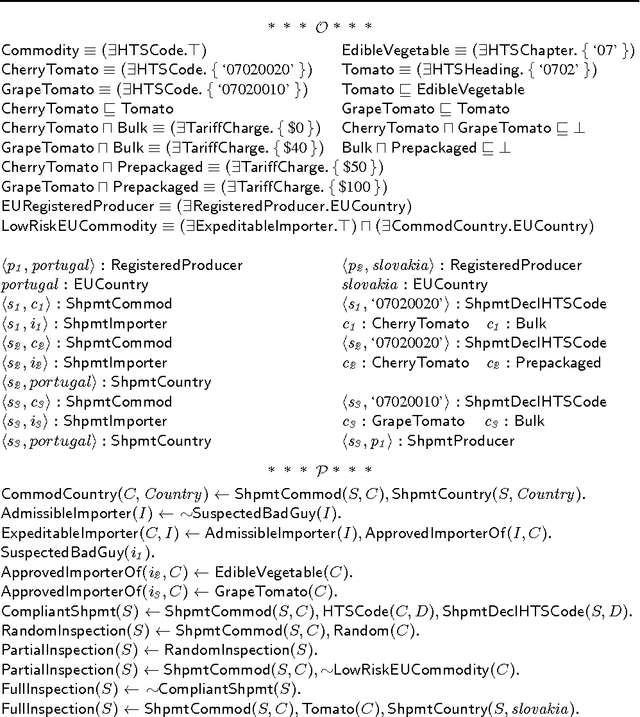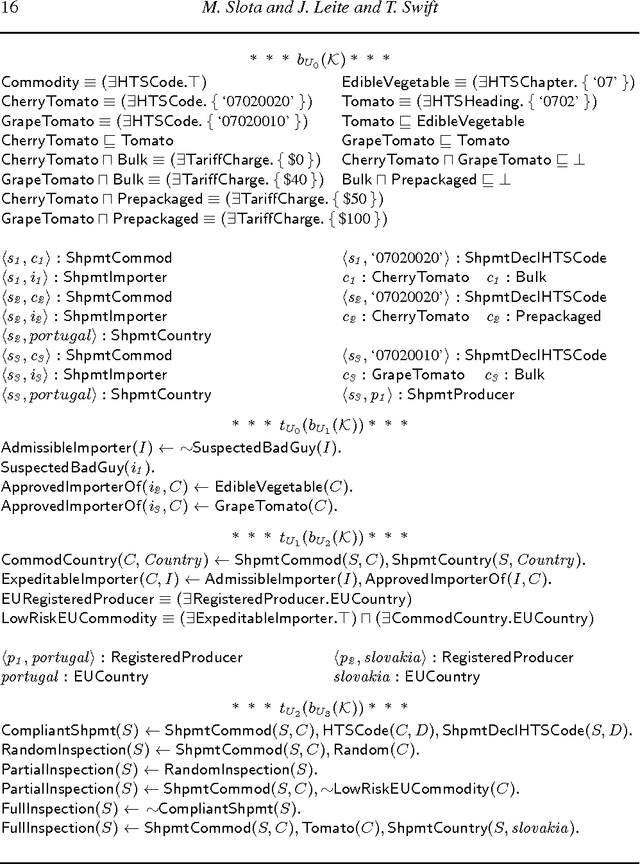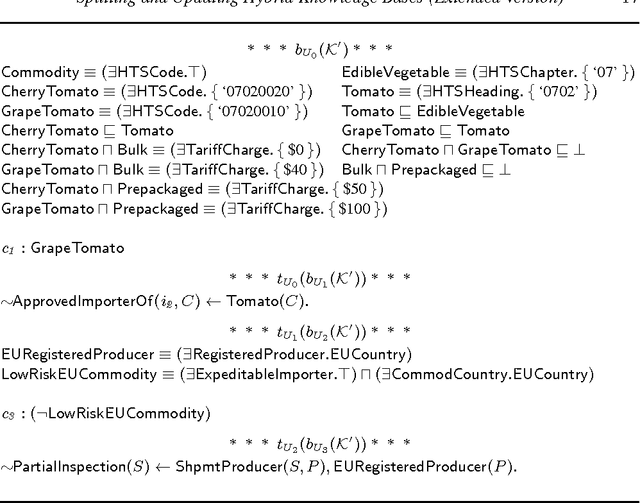Martin Slota
A Brief History of Updates of Answer-Set Programs
Dec 27, 2021
Abstract:Over the last couple of decades, there has been a considerable effort devoted to the problem of updating logic programs under the stable model semantics (a.k.a. answer-set programs) or, in other words, the problem of characterising the result of bringing up-to-date a logic program when the world it describes changes. Whereas the state-of-the-art approaches are guided by the same basic intuitions and aspirations as belief updates in the context of classical logic, they build upon fundamentally different principles and methods, which have prevented a unifying framework that could embrace both belief and rule updates. In this paper, we will overview some of the main approaches and results related to answer-set programming updates, while pointing out some of the main challenges that research in this topic has faced.
Exception-Based Knowledge Updates
Jun 02, 2017



Abstract:Existing methods for dealing with knowledge updates differ greatly depending on the underlying knowledge representation formalism. When Classical Logic is used, updates are typically performed by manipulating the knowledge base on the model-theoretic level. On the opposite side of the spectrum stand the semantics for updating Answer-Set Programs that need to rely on rule syntax. Yet, a unifying perspective that could embrace both these branches of research is of great importance as it enables a deeper understanding of all involved methods and principles and creates room for their cross-fertilisation, ripening and further development. This paper bridges the seemingly irreconcilable approaches to updates. It introduces a novel monotonic characterisation of rules, dubbed RE-models, and shows it to be a more suitable semantic foundation for rule updates than SE-models. Then it proposes a generic scheme for specifying semantic rule update operators, based on the idea of viewing a program as the set of sets of RE-models of its rules; updates are performed by introducing additional interpretations - exceptions - to the sets of RE-models of rules in the original program. The introduced scheme is used to define rule update operators that are closely related to both classical update principles and traditional approaches to rules updates, and serve as a basis for a solution to the long-standing problem of state condensing, showing how they can be equivalently defined as binary operators on some class of logic programs. Finally, the essence of these ideas is extracted to define an abstract framework for exception-based update operators, viewing a knowledge base as the set of sets of models of its elements, which can capture a wide range of both model- and formula-based classical update operators, and thus serves as the first firm formal ground connecting classical and rule updates.
On Strong and Default Negation in Logic Program Updates
Jul 09, 2014
Abstract:Existing semantics for answer-set program updates fall into two categories: either they consider only strong negation in heads of rules, or they primarily rely on default negation in heads of rules and optionally provide support for strong negation by means of a syntactic transformation. In this paper we pinpoint the limitations of both these approaches and argue that both types of negation should be first-class citizens in the context of updates. We identify principles that plausibly constrain their interaction but are not simultaneously satisfied by any existing rule update semantics. Then we extend one of the most advanced semantics with direct support for strong negation and show that it satisfies the outlined principles as well as a variety of other desirable properties.
The Rise and Fall of Semantic Rule Updates Based on SE-Models
Jun 17, 2013Abstract:Logic programs under the stable model semantics, or answer-set programs, provide an expressive rule-based knowledge representation framework, featuring a formal, declarative and well-understood semantics. However, handling the evolution of rule bases is still a largely open problem. The AGM framework for belief change was shown to give inappropriate results when directly applied to logic programs under a non-monotonic semantics such as the stable models. The approaches to address this issue, developed so far, proposed update semantics based on manipulating the syntactic structure of programs and rules. More recently, AGM revision has been successfully applied to a significantly more expressive semantic characterisation of logic programs based on SE-models. This is an important step, as it changes the focus from the evolution of a syntactic representation of a rule base to the evolution of its semantic content. In this paper, we borrow results from the area of belief update to tackle the problem of updating (instead of revising) answer-set programs. We prove a representation theorem which makes it possible to constructively define any operator satisfying a set of postulates derived from Katsuno and Mendelzon's postulates for belief update. We define a specific operator based on this theorem, examine its computational complexity and compare the behaviour of this operator with syntactic rule update semantics from the literature. Perhaps surprisingly, we uncover a serious drawback of all rule update operators based on Katsuno and Mendelzon's approach to update and on SE-models.
Splitting and Updating Hybrid Knowledge Bases (Extended Version)
May 02, 2011


Abstract:Over the years, nonmonotonic rules have proven to be a very expressive and useful knowledge representation paradigm. They have recently been used to complement the expressive power of Description Logics (DLs), leading to the study of integrative formal frameworks, generally referred to as hybrid knowledge bases, where both DL axioms and rules can be used to represent knowledge. The need to use these hybrid knowledge bases in dynamic domains has called for the development of update operators, which, given the substantially different way Description Logics and rules are usually updated, has turned out to be an extremely difficult task. In [SL10], a first step towards addressing this problem was taken, and an update operator for hybrid knowledge bases was proposed. Despite its significance -- not only for being the first update operator for hybrid knowledge bases in the literature, but also because it has some applications - this operator was defined for a restricted class of problems where only the ABox was allowed to change, which considerably diminished its applicability. Many applications that use hybrid knowledge bases in dynamic scenarios require both DL axioms and rules to be updated. In this paper, motivated by real world applications, we introduce an update operator for a large class of hybrid knowledge bases where both the DL component as well as the rule component are allowed to dynamically change. We introduce splitting sequences and splitting theorem for hybrid knowledge bases, use them to define a modular update semantics, investigate its basic properties, and illustrate its use on a realistic example about cargo imports.
* 64 pages; extended version of the paper accepted for ICLP 2011
Back and Forth Between Rules and SE-Models
Mar 01, 2011Abstract:Rules in logic programming encode information about mutual interdependencies between literals that is not captured by any of the commonly used semantics. This information becomes essential as soon as a program needs to be modified or further manipulated. We argue that, in these cases, a program should not be viewed solely as the set of its models. Instead, it should be viewed and manipulated as the set of sets of models of each rule inside it. With this in mind, we investigate and highlight relations between the SE-model semantics and individual rules. We identify a set of representatives of rule equivalence classes induced by SE-models, and so pinpoint the exact expressivity of this semantics with respect to a single rule. We also characterise the class of sets of SE-interpretations representable by a single rule. Finally, we discuss the introduction of two notions of equivalence, both stronger than strong equivalence [1] and weaker than strong update equivalence [2], which seem more suitable whenever the dependency information found in rules is of interest.
Towards Closed World Reasoning in Dynamic Open Worlds (Extended Version)
Jul 23, 2010Abstract:The need for integration of ontologies with nonmonotonic rules has been gaining importance in a number of areas, such as the Semantic Web. A number of researchers addressed this problem by proposing a unified semantics for hybrid knowledge bases composed of both an ontology (expressed in a fragment of first-order logic) and nonmonotonic rules. These semantics have matured over the years, but only provide solutions for the static case when knowledge does not need to evolve. In this paper we take a first step towards addressing the dynamics of hybrid knowledge bases. We focus on knowledge updates and, considering the state of the art of belief update, ontology update and rule update, we show that current solutions are only partial and difficult to combine. Then we extend the existing work on ABox updates with rules, provide a semantics for such evolving hybrid knowledge bases and study its basic properties. To the best of our knowledge, this is the first time that an update operator is proposed for hybrid knowledge bases.
* 40 pages; an extended version of the article published in Theory and Practice of Logic Programming, 10 (4-6): 547 - 564, July. Copyright 2010 Cambridge University Press
 Add to Chrome
Add to Chrome Add to Firefox
Add to Firefox Add to Edge
Add to Edge